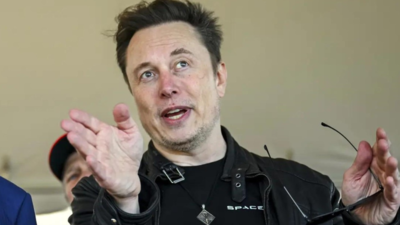- News
- Technology News
- Social News
- Elon Musk: ‘Martians will decide how they are ruled. I recommend direct…’
Trending
Elon Musk: ‘Martians will decide how they are ruled. I recommend direct…’
Elon Musk stated his preference for direct democracy on Mars and indicated uncrewed Starships could land on Mars in approximately two years, with crewed missions potentially following in four years.
Tesla CEO Elon Musk outlined his vision for governance on Mars, advocating for a self-determined society. When asked on X (formerly known as Twitter) whether Mars would follow Earth-style governance, Musk replied, "The Martians will decide how they are ruled. I recommend direct, rather than representative, democracy." Aiming to establish a human colony on the Red Planet, Musk has often shared ideas about the principles that could guide Martian society.
“Uncrewed Starships landing on Mars in ~2 years, perhaps with crewed versions passing near Mars, and crewed Starships heading there in ~4 years are all possible,” he further added.
“I believe the timeline you mentioned here is possible, but my only long term concern about Starship are the heat tiles, they are far from being reusable,” replied one user to Musk. the world’s richest individual answered stating “I am confident that we will figure out a fully reusable (technically, a high multi-flight reusable) heat shield in 2025”.
Elon Musk says human civilization on Mars by January 2029
In another post, Musk mentioned a Mars transfer window in December 2028 or January 2029, which could allow SpaceX to send humans to Mars. “The future is approaching rapidly,” he said, highlighting the progress being made.
In October this year, after SpaceX successfully recovered its Super Heavy rocket, Elon Musk discussed the massive costs involved in building a self-sustaining city on Mars. He estimated the cost to exceed $1,000 trillion, far surpassing the current U.S. GDP of $29 trillion.
Musk explained that NASA’s recent Mars missions cost around $1 billion per ton of useful cargo delivered to the planet’s surface. To make colonizing Mars possible, he stressed the need for significant advancements in rocket and spacecraft technology, suggesting a 1,000-fold reduction in costs is crucial to make the idea financially feasible.
Last week, Musk suggested renaming Mars to "New World." In an X post, he compared the idea to how America was named and included a photo of Mars' Gale Crater taken by the Curiosity rover. This proposal aligns with Musk's ambition to establish a self-sustaining human colony on Mars, making humanity a multi-planetary species.
End of Article
Latest Mobiles
FOLLOW US ON SOCIAL MEDIA
Hot Picks
TOP TRENDING
Explore Every Corner
Across The Globe












